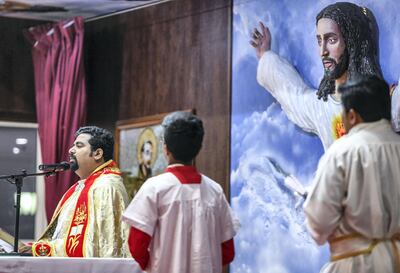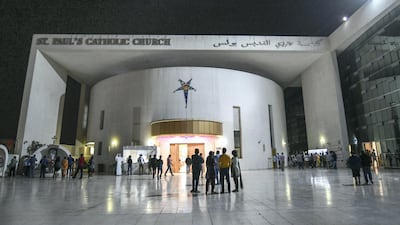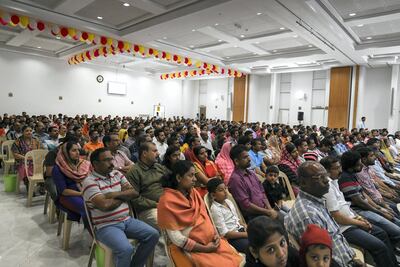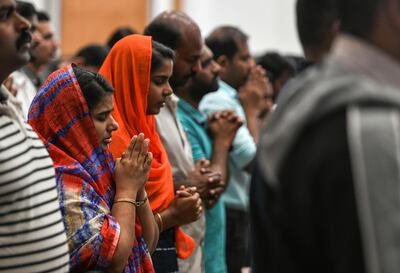In a dusty side road surrounded by auto repair shops there is a large white box with shiny windows — this is St Paul’s Catholic Church, Mussaffah.
There are no ornate spires or stained-glass windows, the outside of the church is a thoroughly modern affair, with clean lines and tasteful lighting. But like many things in the UAE, inside there is a mishmash of cultures and languages.
St Paul’s was the second church to open in Abu Dhabi, inaugurated by the Vatican’s secretary of state, Cardinal Pietro Parolin, Apostolic Vicar of Southern Arabia, Bishop Paul Hinder and Sheikh Nahyan bin Mubarak, then Minister of Culture, Youth and Community Development, in 2015.
Before that, St Joseph’s had been the only Catholic church in the capital for almost 50 years.
There are now nine across the country, serving the almost one million Catholics that call this home — that’s about one in 10 of the UAE’s population.
And, unusually, with congregations increasingly turning their backs on the church in the West, churches in the majority-Muslim UAE are flourishing.
In fact, one of the main issues affecting churches in the Emirates is overcrowding.
St Joseph’s has expanded over the years to cope with its swelling congregation and there is talk of a new church being built in Abu Dhabi’s Ruwais. St Paul’s, too, attracts huge crowds, especially on Fridays when low-paid workers, largely from the Subcontinent, attend the 9am morning Mass in huge numbers.
Set in Mussaffah, an industrial district in south-west Abu Dhabi, the church caters to the blue-collar workers who live there, among others. Its 10,000 members and 8,000 weekly Mass attendees have 25 different nationalities, including Filipino, Sri Lankan and Lebanese, as well as Catholics from Africa and Eastern Europe.
The church hosts 15 weekly Masses with services in at least 10 languages, including the popular Malayalam from India’s Kerala, as well as Konkani from Goa, Tamil, Arabic, Tagalog and English.
“People are away from their country and there is a lot of stress and strain from their job. They often leave their families to come here for work, and they are alone over here,” said Nicole D’Souza, 35, who serves as secretary and on the church council.
“What fills that loneliness is the church, they feel belonging with the community and welcomed by others.
“Being able to communicate in their own language helps and helps them feel at home."

The community is reflected within the church’s walls — while the large main nave is humble with its two levels of pews pointing towards a simple lectern and straightforward crucifix, the smaller St Francis of Assis Hall reflects the colour and vibrancy of the community. Bright helium balloons scrape the ceiling on Mass day, and behind the lectern a large figure of Jesus with a burning red heart lurches out from the wall.
Father Avi Xavier, parish priest at St Paul’s, said that the Parish is “blessed to have such a beautiful church”.

“I find the belonging to the church is more here than in other places. The moment after people land here, they come to church and surrender themselves to God.
“The faith of the people is very, very strong. They keep God at the centre of their life — they come for Mass and take part in the community.
“Everyone feels ’this is my church,’ ‘this is our church’.
The church also offers lessons and activities free-of-charge to members, and a free bus service makes sure no one need miss a Mass.

“There is unity in diversity, and we really enjoy the strength of our parishioners,” said Father Xavier.
The church’s existence is thanks to the UAE’s commitment to allowing people the freedom to practise their religion. It is a sentiment echoed in the country’s invitation to Pope Francis to visit Abu Dhabi in February to deliver a landmark public Mass in the capital.
Roy Ansil, 43, from Kerala in India, goes to Mass every day at St Paul’s, or sometimes at St Joseph’s, in either English or his native Malayalam.
His wife is flying in from India for two days especially for the Pope’s Mass, which she managed to get one of a “very limited” number of non-GCC-resident tickets for.
“In this part of the world, we are blessed that we can come for the service every day. There’s no problem, nobody restricts us, nobody asks where you are going,” he said.
“St Paul’s is great. We attended Mass here and there is a Filipino community, an African community and Europeans that attend. Being with a good community is really good.
“We are happy that we are getting Masses every day.”
Selling merchandise for the Pope’s visit of T-shirts and memorabilia bearing the event's special logo, Asagwoa Darlington, also known as Namdi, 38, from Nigeria, has been in the UAE for one year.
![“What fills up the loneliness is the church, [workers] feel belonging with the community and welcomed by others," said Nicole D'Souza, secretary of the church council. Khushnum Bhandari / The National](https://www.thenationalnews.com/resizer/v2/OOXYJ2L7JJYBBZLIQTFPE3LYQQ.jpg?smart=true&auth=30b18c423ecd60d6ae9d27c9cfbc4e366ba2d2195073a7bc44d923fb3b22553d&width=400&height=273)
He has seen a pope once before - John Paul II visited Nigeria in 1998 - but said he is blessed to have the chance to see Pope Francis.
“It was a blessing, and I believe it will be a blessing to the UAE as well,” he said.
And in the courtyard nearby, people from all over the world light prayer candles for their loved ones at home – it is another act of unity among a diverse crowd.
Once they are all lined up, shining brightly against the dark sky, they are almost impossible to distinguish from one another.




